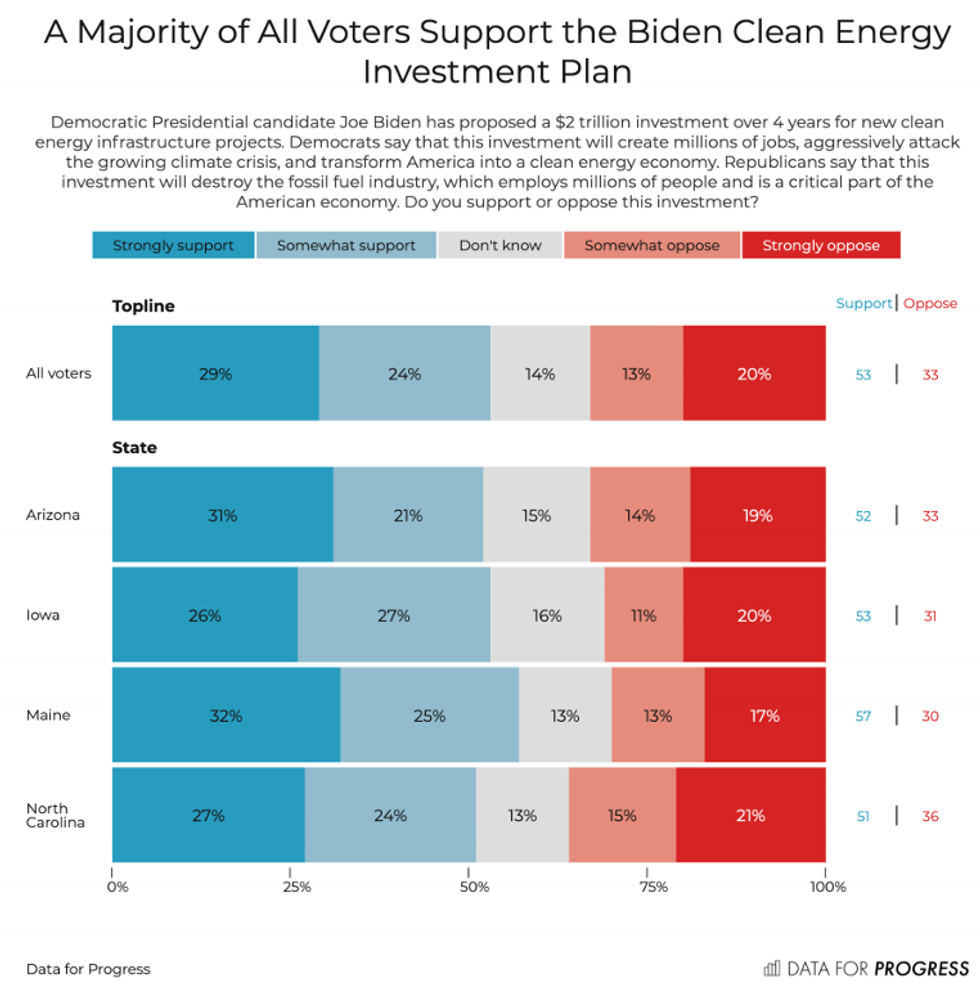October, 12 2020, 12:00am EDT

New Analysis: GOP's Green New Deal Attacks Fall Flat
With less than a month to go in the election, this past week showed that Republicans up and down the ballot are making their false claims about the Green New Deal and attacks on climate action a centerpiece of their closing argument. A review of publicly available polling data shows that these attacks, as well as attacks on Vice President Joe Biden's plan to build an equitable, clean energy future are falling flat with voters.
WASHINGTON
With less than a month to go in the election, this past week showed that Republicans up and down the ballot are making their false claims about the Green New Deal and attacks on climate action a centerpiece of their closing argument. A review of publicly available polling data shows that these attacks, as well as attacks on Vice President Joe Biden's plan to build an equitable, clean energy future are falling flat with voters.
"Deciding to close the election with false attacks on the Green New Deal and other pro-climate action policies is a big mistake for Republicans," said Climate Power 2020 Executive Director Lori Lodes. "In reality, voters overwhelmingly support bold government action on climate and are more likely to back candidates who support it. In Trump's must-win state of Pennsylvania, for example, data shows a debate over fracking and climate change significantly boosted Biden's standing with voters. Voters see through Republicans' bizarre lies about banning cars, airplanes, and hamburgers, and they are punishing Trump and Republicans for their COVID and climate denial."
A new comprehensive analysis of the Green New Deal and pro-climate policies by Data for Progress found a plurality of voters have a favorable impression of the Green New Deal when asked directly. A plurality of voters also think the Green New Deal is a good idea. Support among Democrats for the policy is more intense than opposition among Republicans; independents are split almost evenly. As Data for Progress concluded, "the policy is not as big of a boogeyman as pundits make it out to be."
Republicans Go On the Attack on the Green New Deal; Democrats Tout Climate, Clean Energy and Conservation
In recent interviews, at events on the campaign trail, and during the presidential and vice-presidential debates, both Trump and Pence have spent considerable time leveling false and misleading attacks on the Green New Deal and other pro-climate policies. For instance, in the 90 minute vice-presidential debate, Pence mentioned the "Green New Deal" 15 times. The attacks are not limited to the top of the ticket. In recent weeks across the Senate battlefield, Republican candidates and outside groups have run anti-Green New Deal ads in Alaska, Michigan, Montana, New Mexico, Iowa, North Carolina, Maine, and Georgia.
Despite these false attacks, the Real Clear Politics (RCP) average shows Vice President Biden and Sen. Kamala Harris are currently leading in all of the following states: Pennsylvania (+7.1), Ohio (+0.6), Florida (+3.7), Wisconsin (+5.5), North Carolina (+1.4), Michigan (+6.7), Minnesota (+9.4), Iowa (+1.2), Arizona (+2.7), Nevada (+6.0), New Hampshire (+9.0), and Colorado (+10.0).
In addition, the 538 forecast currently predicts a victory for Biden and Harris in Ohio, North Carolina, Arizona, Florida, Pennsylvania, Wisconsin, Nevada, Minnesota, Michigan, Colorado, Maine, and Nebraska's 2nd District.
Pro-climate candidates and outside groups understand climate, clean energy, and conservation are winning issues, and they are making it a key part of their advertising and voter contact strategies in the final month across the Senate battleground.

In the fight for the Senate, 538 predicts a 68% chance of voters returning a pro-climate Democratic majority. In individual races, pro-climate Democrats remain favored to win or be competitive across the battleground. As the New York Times reported, Republicans are on defense and spending tens of millions of dollars in deep-red states such as South Carolina and Kansas.
Climate and Fracking Debate Boosts Biden in Pennsylvania, While Green New Deal Attacks Fall Short
Late August polls conducted by CBS News and Climate Power 2020 and League of Conservation Voters both show the conventional wisdom around fracking is no longer true. The Climate Power 2020 poll found that not only are Pennsylvania voters supportive of climate action and additional regulations on fracking, engaging in a debate around fracking and climate clearly helped Joe Biden, strengthening his favorability rating and increasing his lead over President Donald Trump in the state.
In that survey, Biden led Trump by a margin of 8 percentage points (50%/42%). Notably, that advantage increased to a 15-point lead when the debate was centered around fracking, clean energy, and climate change -- dispelling the conventional belief that a focus on fracking will pull down support for Democrats and Biden in the state.
The messages presented to voters in the survey closely mirror the frequent attacks leveled against Biden's plan for clean energy investments, including negative messaging on the Green New Deal and socialism, and false claims that Biden's plan will cost Pennsylvania 600,000 jobs. You can see the exact language on fracking and the Green New Deal tested in this memo.
Another key finding from the poll was that Keystone State voters, including those in Southwestern Pennsylvania, strongly support bold action on climate change, investments in clean energy infrastructure, and stronger regulations on the fracking industry. By a 61-30 margin, voters in the Pittsburgh DMA support placing stronger regulations on oil and gas fracking, such as increasing the minimum distance between fracking sites and homes and requiring the disclosure of all chemicals used in fracking.
Pennsylvania Voters also overwhelmingly favor two policies that form the foundation of Biden's climate plan:
- 74% support transitioning the country to 100% clean electricity by 2035 and 73% support a clean energy economy by 2050.
- 71% favor investing $2 trillion over the next four years to build clean energy infrastructure.
Battleground Voters Strongly Support Bold Action on Climate
Biden has pledged to achieve 100% clean electricity by 2035. Late September surveys conducted by Data for Progress found strong support for this policy in key presidential and Senate battlegrounds:
- In Arizona, 58% of likely voters, including 54% of independents, support this goal.
- In Iowa, 55% of likely voters, including 53% of independents, support this goal.
- In Maine, 65% of likely voters, including 61% of independents, support this goal.
- In South Carolina, 52% of likely voters, including 57% of independents, support this goal.
Data for Progress surveys conducted in August in Arizona, Iowa, Maine, and North Carolina also found strong support for bold action on climate.
By large margins, voters were more likely to support a candidate backing 100% clean electricity by 2035:
- Arizona: 54-26
- Iowa: 53-26
- Maine: 57-23
- North Carolina: 50-29
Similarly, voters in these battleground states were also more likely to support a candidate backing $2 trillion in clean energy infrastructure:
- Arizona: 57-26
- Iowa: 57-24
- Maine: 55-26
- North Carolina: 53-30
When Biden was named and the Republican counterattack was presented, voters still supported the Biden clean energy investment plan by substantial margins:
|
Climate Power 2020 is putting the Trump administration on defense every single day for ignoring experts, refusing to believe in science, surrendering our government to big oil executives, and gutting public health protections, all at the expense of future generations. The 2020 presidential election is the defining moment for how our nation addresses the climate crisis--our leaders must be emboldened to take immediate action on climate change and to build a just and equitable economy. The time to act is now. Learn more: climatepower2020.org
LATEST NEWS
'MAGA Power Grab': US Supreme Court OKs 2026 Map That Texas GOP Rigged for Trump
One journalist who covers voting rights called the decision upholding the new districts "yet another example" of how the high court "has greenlit the many undemocratic schemes of Trump and his party."
Dec 04, 2025
The US Supreme Court's right-wing supermajority on Thursday gave Texas Republicans a green light to use a political map redrawn at the request of President Donald Trump to help the GOP retain control of Congress in the 2026 midterm elections.
Since Texas lawmakers passed and GOP Gov. Greg Abbott signed the gerrymandering bill in August, Democratic California Gov. Gavin Newsom and his constituents have responded with updated congressional districts to benefit Democrats, while Republican legislators in Indiana, Missouri, and North Carolina—under pressure from the president—have pursued new maps for their states.
With Texas' candidate filing period set to close next week, a majority of justices on Thursday blocked a previous decision from two of three US district court judges who had ruled against the state map. The decision means that, at least for now, the state can move ahead with the new map, which could ultimately net Republicans five more seats, for its March primary elections.
"Texas is likely to succeed on the merits of its claim that the district court committed at least two serious errors," the Supreme Court's majority wrote. "First, the district court failed to honor the presumption of legislative good faith by construing ambiguous direct and circumstantial evidence against the Legislature."
"Second, the district court failed to draw a dispositive or near-dispositive adverse inference against respondents even though they did not produce a viable alternative map that met the state's avowedly partisan goals," the majority continued. "The district court improperly inserted itself into an active primary campaign, causing much confusion and upsetting the delicate federal-state balance in elections."
Texas clearly did a racial gerrymander, which is illegal.A district court found that Texas did a racial gerrymander, rejecting the new map because it is illegal.But the Supreme Court reversed it.Because? Must assume the gerrymanderers were acting in good faith (despite the evidence otherwise).
[image or embed]
— Nicholas Grossman (@nicholasgrossman.bsky.social) December 4, 2025 at 6:18 PM
The court's three liberals—Justices Ketanji Brown Jackson, Elena Kagan, and Sonia Sotomayor—dissented. Contrasting the three-month process that led to the map initially being struck down and the majority's move to reverse "that judgment based on its perusal, over a holiday weekend, of a cold paper record," Kagan wrote for the trio that "we are a higher court than the district court, but we are not a better one when it comes to making such a fact-based decision."
"Today's order disrespects the work of a district court that did everything one could ask to carry out its charge—that put aside every consideration except getting the issue before it right," Kagan asserted. "And today's order disserves the millions of Texans whom the district court found were assigned to their new districts based on their race."
"This court's stay guarantees that Texas' new map, with all its enhanced partisan advantage, will govern next year's elections for the House of Representatives. And this court's stay ensures that many Texas citizens, for no good reason, will be placed in electoral districts because of their race," she warned. "And that result, as this court has pronounced year in and year out, is a violation of the Constitution."
Simply amazing that the Supreme Court declared an end to legal race discrimination in the affirmative action case two years ago and now allows overt racism in both immigration arrests and redistricting.Using race to help minorities? Bad. Using it to discriminate against them? Very, very good.
[image or embed]
— Mark Joseph Stern (@mjsdc.bsky.social) December 4, 2025 at 6:52 PM
Top Democrats in the state and country swiftly condemned the court's majority. Democratic National Committee Chair Ken Martin called it "wrong—both morally and legally," and argued that "once again, the Supreme Court gave Trump exactly what he wanted: a rigged map to help Republicans avoid accountability in the midterms for turning their backs on the American people."
"But it will backfire," Martin predicted. "Texas Democrats fought every step of the way against these unlawful, rigged congressional maps and sparked a national movement. Democrats are fighting back, responding in kind to even the playing field across the country. Republicans are about to be taught one valuable lesson: Don't mess with Texas voters."
Texas House Minority Leader Gene Wu (D-137) declared that "the Supreme Court failed Texas voters today, and they failed American democracy. This is what the end of the Voting Rights Act looks like: courts that won't protect minority communities even when the evidence is staring them in the face."
"I'm angry about this ruling. Every Texan who testified against these maps should be angry. Every community that fought for generations to build political power and watched Republicans try to gerrymander it away should be angry. But anger without action is just noise, and Democrats are taking action to fight back," he continued, pointing to California's passage of Proposition 50 and organizing in other states, including Illinois, New York, and Virginia. "A nationwide movement is being built that says if Republicans want to play this game, Democrats will play it better."
SCOTUS conservative justices upholding Texas gerrymander is yet another example of how Roberts court has greenlit the many undemocratic schemes of Trump and his partyThey’ve now ruled for Trump and his allies in 90 percent of shadow docket opinions www.motherjones.com/politics/202...
[image or embed]
— Ari Berman (@ariberman.bsky.social) December 4, 2025 at 6:52 PM
Christina Harvey, executive director of the progressive advocacy group Stand Up America, said in a statement that "the right-wing majority on the Supreme Court just handed Republicans five new seats in Congress, rubber-stamping Texas Republicans' MAGA power grab. Make no mistake: This isn't about fair representation for Texans. It is about sidelining voters of color and helping Trump and Republican politicians dodge accountability for their unpopular agenda."
"In America, voters get to choose their representatives, not the other way around," she stressed. "But this captured court undermines this basic democratic principle at every turn. We deserve a Supreme Court that protects the freedom to vote and strengthens democracy instead of enabling partisan politics. It's time for Democrats in Congress to get serious about plans for Supreme Court reform once Trump leaves office, including term limits, an enforceable code of ethics, and expanding the court."
Various journalists and political observers also suggested that, despite Thursday's decision in favor of politically motivated mid-decade redistricting, the high court's right-wing majority may ultimately rule against the California map—which, if allowed to stand, could cancel out the impact of Texas gerrymandering by likely erasing five Republican districts.
Keep ReadingShow Less
Demands to Release Full Video of Deadly US Boat Strike Grow After Congressional Briefing
"The Department of Defense has no choice but to release the complete, unedited footage," said Sen. Jack Reed.
Dec 04, 2025
Calls mounted Thursday for the Trump administration to release the full video of a September US airstrike on a boat allegedly transporting drugs in the Caribbean Sea following a briefing between Pentagon officials and select lawmakers that left some Democrats with more questions than answers.
“I am deeply disturbed by what I saw this morning," Sen. Jack Reed (D-RI), the ranking member of the Senate Armed Services Committee, said after the briefing. "The Department of Defense has no choice but to release the complete, unedited footage of the September 2 strike, as the president has agreed to do."
Reed's remarks came after Adm. Frank Bradley and Joint Chiefs of Staff Chair Gen. Dan Caine briefed some members of the Senate and House Armed Services and Intelligence committees on the so-called "double-tap" strike, in which nine people were killed in the initial bombing and two survivors clinging to the burning wreckage of the vessel were slain in second attack.
Lawmakers who attended the briefing said that US Defense Secretary Pete Hegseth allegedly did not give an order to "kill everyone" aboard the boat. However, legal experts and congressional critics contend that the strikes are inherently illegal under international law.
“This did not reduce my concerns at all—or anyone else’s,” Rep. Adam Smith (D-Wash.), who attended the briefing, told the New Republic's Greg Sargent in response to the findings regarding Hegseth's actions. “This is a big, big problem, and we need a full investigation.”
"I think that video should be public," Smith added.
The Trump administration has tried to justify the strikes to Congress by claiming that the US is in an "armed conflict" with drug cartels, which some legal scholars and lawmakers have disputed.
Cardozo Law School professor of international law Rebecca Ingbe told Time in a Thursday interview that "there is no actual armed conflict here, so this is murder."
Sen. Chris Van Hollen (D-Md.), a member of the Foreign Relations Committee, said Thursday that “clearly, in my view, very likely a war crime was committed here."
“We don't use our military to help intervene when it comes to drug running, and what the Trump administration has done is manufactured cause for conflict with respect to going after drug boats and engaging in extrajudicial killing when the real aim is clearly regime change in Venezuela," he added, alluding to President Donald Trump's massive military deployment and threats to invade the oil-rich South American nation.
At least 83 people have been killed in 21 disclosed strikes on boats the Trump administration claims—without releasing evidence—were transporting drugs in the Caribbean Sea and Pacific Ocean. South American leaders and relatives of survivors say that at least some of the victims of the US bombings were fishermen with no ties to narco-trafficking.
Reed said that Thursday's briefing "confirmed my worst fears about the nature of the Trump administration’s military activities, and demonstrates exactly why the Senate Armed Services Committee has repeatedly requested—and been denied—fundamental information, documents, and facts about this operation."
"This must, and will be, only the beginning of our investigation into this incident," he vowed.
After the briefing, US Rep. Jim Himes (D-Conn.)—the ranking member of the House Permanent Select Committee on Intelligence—called the footage “one of the most troubling things I’ve seen in my time in public service.”
“Any American who sees the video that I saw will see its military attacking shipwrecked sailors,” he added.
Thursday's calls followed similar demands from skeptical Democrats, some of whom accused the Trump administration of withholding evidence.
"Pete Hegseth should release the full tapes of the September 2 attack," Senate Minority Leader Chuck Schumer (D-NY) said on the upper chamber floor on Tuesday. "Both the first and second strike. Not a clip. Not some edited or redacted snippet. The full unedited tapes of each strike must be released so the American people can see what happened with their own eyes."
"Pete Hegseth said he did nothing wrong," he added. "So prove it."
Keep ReadingShow Less
Microplastics Make Up Majority of National Park Trash, Waste Audit Finds
“Even in landscapes that appeared untouched,” volunteers found “thousands of plastic pellets and fragments that pose a clear threat to the environment, wildlife, and human health,” said a 5 Gyres Institute spokesperson.
Dec 04, 2025
More than half the trash polluting America's national parks and federal lands contains hazardous microplastics, according to a waste audit published Thursday.
As part of its annual "TrashBlitz" effort to document the scale of plastic pollution in national parks and federal lands across the US, volunteers with the 5 Gyres Institute collected nearly 24,000 pieces of garbage at 59 federally protected locations.
In each of the four years the group has done the audit, they've found that plastic has made up the vast majority of trash in the sites.
They found that, again this year, plastic made up 85% of the waste they logged, with 25% of it single-use plastics like bottle caps, food wrappers, bags, and cups.
But for the first time, they also broke down the plastics category to account for microplastics, the small fragments that can lodge permanently in the human body and cause numerous harmful health effects.
As a Stanford University report from January 2025 explained:
In the past year alone, headlines have sounded the alarm about particles in tea bags, seafood, meat, and bottled water. Scientists have estimated that adults ingest the equivalent of one credit card per week in microplastics. Studies in animals and human cells suggest microplastics exposure could be linked to cancer, heart attacks, reproductive problems, and a host of other harms.
Microplastics come in two main forms: pre-production plastic pellets, sometimes known as "nurdles," which are melted down to make other products; and fragments of larger plastic items that break down over time.
The volunteers found that microplastic pellets and fragments made up more than half the trash they found over the course of their survey.
"Even in landscapes that appeared untouched, a closer look at trails, riverbeds, and coastlines revealed thousands of plastic pellets and fragments that pose a clear threat to the environment, wildlife, and human health,” said Nick Kemble, programs manager at the 5 Gyres Institute.
Most of the microplastics they found came in the form of pellets, which the group's report notes often "spill in transit from boats and trains, entering waterways that carry them further into the environment or deposit them on shorelines."
The surveyors identified the Altria Group—a leading manufacturer of cigarettes—PepsiCo, Anheuser-Busch InBev, the Coca-Cola Company, and Mars as the top corporate polluters whose names appeared on branded trash.
But the vast majority of microplastic waste discovered was unbranded. According to the Coastal & Estuarine Research Federation, petrochemical companies such as Dow, ExxonMobil, Shell, and Formosa are among the leading manufacturers of pellets found strewn across America's bodies of water.
The 5 Gyres report notes that "at the federal level in the United States, there is no comprehensive regulatory framework that specifically holds these polluters accountable, resulting in widespread pollution that threatens ecosystems and wildlife."
The group called on Congress to pass the Reducing Waste in National Parks Act, introduced in 2023 by Sen. Jeff Merkley (D-Ore.), which would reduce the sale of single-use plastics in national parks. It also advocated for the Plastic Pellet Free Waters Act, introduced last year by Rep. Mike Levin (D-Calif.) and then-Rep. Mary Peltola (D-Alaska), which would prohibit the discharge of pre-production plastic pellets into waterways, storm drains, and sewers.
"It’s time that our elected officials act on the warnings we’ve raised for years—single-use plastics and microplastics pose an immediate threat to our environment and public health," said Paulita Bennett-Martin, senior strategist of policy initiatives at 5 Gyres. "TrashBlitz volunteers uncovered thousands of microplastics in our nation’s most protected spaces, and we’re urging decisive action that addresses this issue at the source."
Keep ReadingShow Less
Most Popular



